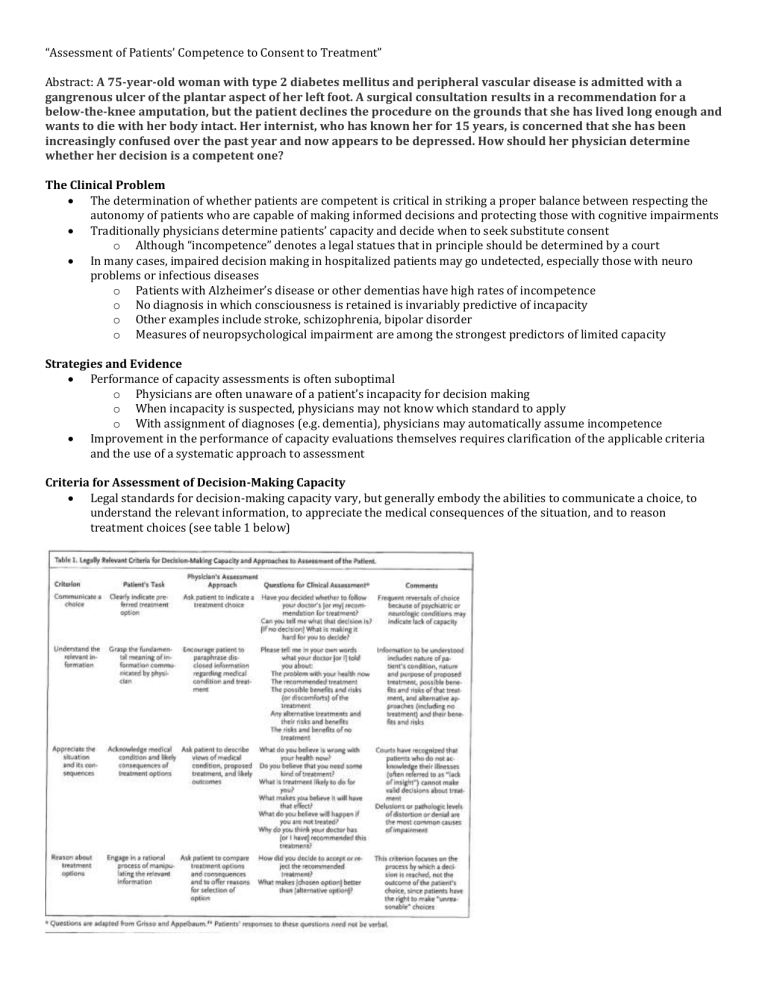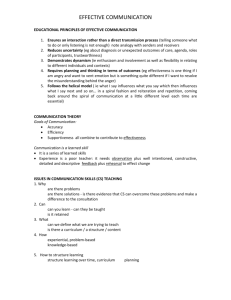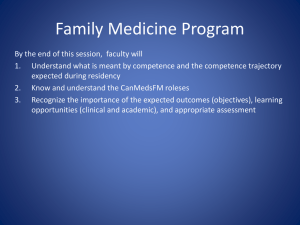
“Assessment of Patients’ Competence to Consent to Treatment” Abstract: A 75-year-old woman with type 2 diabetes mellitus and peripheral vascular disease is admitted with a gangrenous ulcer of the plantar aspect of her left foot. A surgical consultation results in a recommendation for a below-the-knee amputation, but the patient declines the procedure on the grounds that she has lived long enough and wants to die with her body intact. Her internist, who has known her for 15 years, is concerned that she has been increasingly confused over the past year and now appears to be depressed. How should her physician determine whether her decision is a competent one? The Clinical Problem The determination of whether patients are competent is critical in striking a proper balance between respecting the autonomy of patients who are capable of making informed decisions and protecting those with cognitive impairments Traditionally physicians determine patients’ capacity and decide when to seek substitute consent o Although “incompetence” denotes a legal statues that in principle should be determined by a court In many cases, impaired decision making in hospitalized patients may go undetected, especially those with neuro problems or infectious diseases o Patients with Alzheimer’s disease or other dementias have high rates of incompetence o No diagnosis in which consciousness is retained is invariably predictive of incapacity o Other examples include stroke, schizophrenia, bipolar disorder o Measures of neuropsychological impairment are among the strongest predictors of limited capacity Strategies and Evidence Performance of capacity assessments is often suboptimal o Physicians are often unaware of a patient’s incapacity for decision making o When incapacity is suspected, physicians may not know which standard to apply o With assignment of diagnoses (e.g. dementia), physicians may automatically assume incompetence Improvement in the performance of capacity evaluations themselves requires clarification of the applicable criteria and the use of a systematic approach to assessment Criteria for Assessment of Decision-Making Capacity Legal standards for decision-making capacity vary, but generally embody the abilities to communicate a choice, to understand the relevant information, to appreciate the medical consequences of the situation, and to reason treatment choices (see table 1 below) Determining Whether Impairment Constitutes Incompetence When physicians perform competence assessments, they should attempt to strike the same balance that would result if a court in the jurisdiction decided the case Presumption is that the vast majority of persons are capable of making their own decisions In practice, the stringency of the test applied varies directly with the seriousness of the likely consequences of the patient’s decisions o This “sliding scale” approach is generally accepted Approaches to Assessment Usually assessment will be implicit, since in the absence of a reason to question a patient’s decision making, the presumption of competence will prevail When explicit competence evaluation is required, physicians should be aware of the relevant criteria and use a structured approach to assessment Psychiatric consultation may be helpful in particularly complex cases or when mental illness is present MMSE found to correlate with clinical judgments of incapacity o Scores range from 0-30, and <19 indicates incompetence, though no single cutoff yields both high sensitivity and specificity Other instruments for assessment include the MacArthur Competence Assessment Tool for Treatment o A structured interview that generates quantitative scores for all four criteria related to decision making capacity o Takes about 20 minutes to administer and score Regardless of the approach to assessment, examiners should first ensure that patients have been given the information relevant to making an informed decision o Patients should generally be informed of the purpose of the evaluation, but need not give explicit consent for the assessment to occur Consequences of Finding Incompetence Unless the patient’s condition requires a substitute decision immediately, efforts should be maid to identify the causes of the impairment and remedy them If it is clear that a patient lacks the capacity to make treatment decisions, a substitute decision maker must be sought o In emergencies, physicians can provide appropriate care under the presumption that a reasonable person would have consented o Look to advance directives o In absence of AD, and when time is available, look to famil members Order is usually spouse, adult children, parents, siblings, and other relatives Areas of Uncertainty Divergence of opinion about which criteria should be included and how they should be applied The various instruments differ in their identification of patients who are impaired No clear standard against which clinical determinations can be measured Guidelines Currently no formal practice guidelines regarding assessment of a patient’s capacity to consent to treatment







